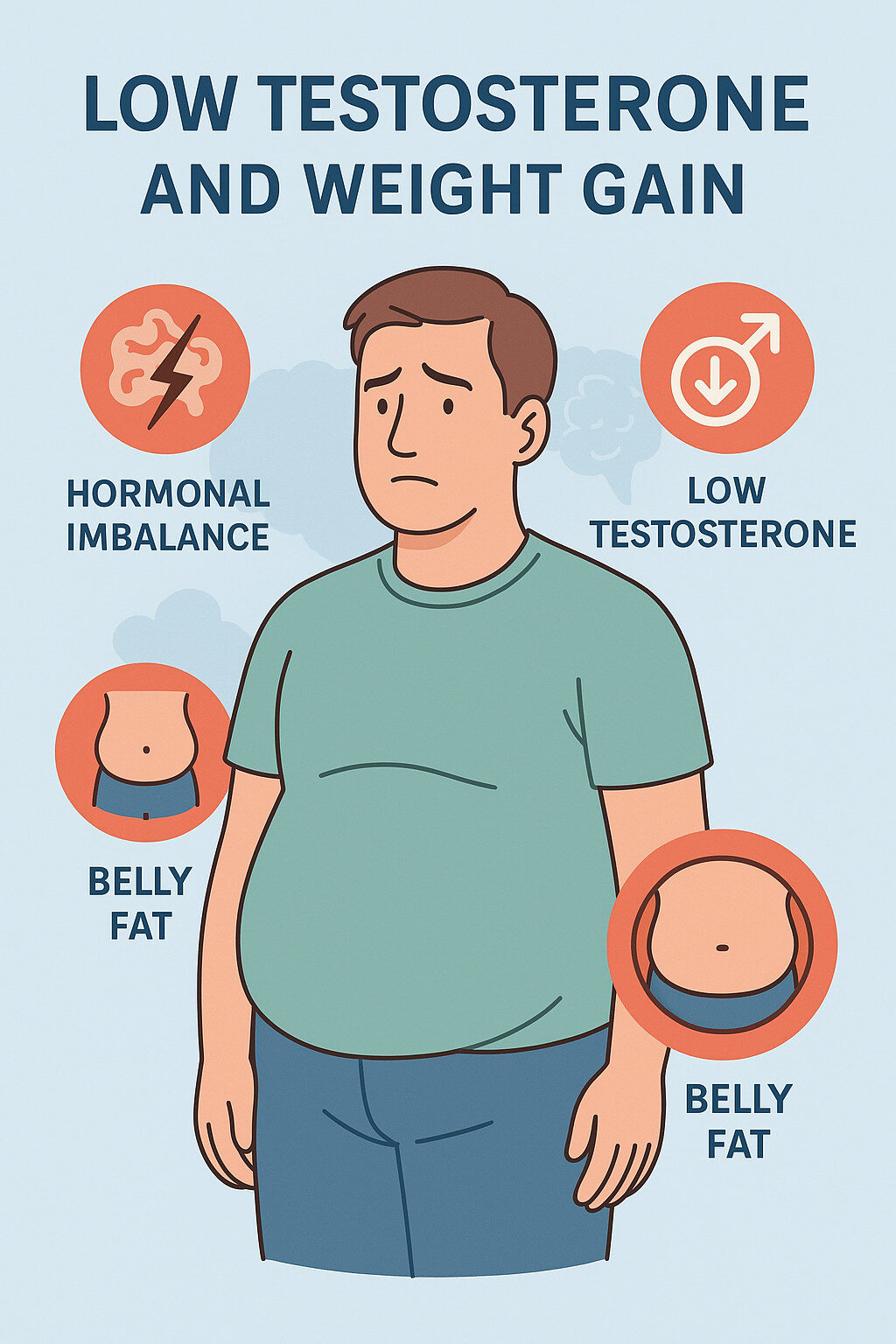Let’s cut to the chase: You’re working out, eating decently, but your pants keep getting tighter. You’re frustrated, confused, and maybe even a little embarrassed. What gives? You’ve heard whispers about hormones being a factor, but testosterone? Isn’t that just for guys obsessed with bench presses? Not exactly.Let’s talk about how hormone imbalances—especially dropping testosterone—might be sabotaging your waistline—and what you can actually do about it. more information https://ugatl.com/services/low-testosterone/can-low-testosterone-cause-weight-gain/
Testosterone 101: It’s Not Just a “Gym Bro” Hormone
Okay, real talk. Testosterone isn’t just about bulging biceps or a high sex drive. Think of it as your body’s behind-the-scenes project manager. For men, it’s made in the testes; for women, the ovaries (though in smaller amounts). Here’s what it’s quietly running:
- Muscle Maintenance: More muscle = more calories burned, even when you’re couch-bound.
- Fat Distribution: It decides whether fat camps out on your hips or your abs.
- Energy Levels: Ever feel like you’re running on 1% battery? Testosterone helps with that.
- Mood Stability: Low levels can make you irritable or foggy-brained—like PMS, but all the time.
But here’s the kicker: Testosterone doesn’t stay forever. For men, it dips about 1% yearly after 30. For women, menopause can tank it. When levels crash, your body starts acting like a rebellious teenager—and not in a cool way.
The Sneaky Ways Hormonal Shifts Can Cause Weight Gain
You’re not imagining things. Low testosterone can turn your body into a fat-storing machine. Let’s break it down: https://ugatl.com/services/low-testosterone/
1. Muscle Meltdown = Metabolism Sabotage
Imagine your muscles are calorie-burning furnaces. This hormone fuels those furnaces. When it dips muscle shrinks, and your metabolism slams on the brakes. Suddenly, that daily muffin you’ve eaten for years starts sticking to your gut. A 2017 study found men with low testosterone had up to 30% less muscle mass than peers with normal levels. Ouch.
2. Belly Fat Becomes Your Worst Frenemy
Reduced T-levels create a perfect storm for belly fat—the dangerous kind that hugs your organs like a creepy ex. This isn’t just about looks. Visceral fat pumps out inflammatory chemicals that mess with insulin (your blood sugar bouncer), making your body store even more fat. It’s a vicious cycle.
3. Cravings Go Full Gremlin Mode
Ever crave carbs like your life depends on it? Low testosterone can spike estrogen in men (yes, guys have it too) and throw hunger hormones like leptin and ghrelin out of whack. Your brain screams, “Eat the entire pizza!” while your jeans scream, “Please don’t.”
4. You’re Too Tired to Care
Hormonal decline drains your energy. When you’re exhausted, hitting the gym feels like climbing Everest in flip-flops. So you skip workouts, lose more muscle, and… well, you get the picture.
But fatigue isn’t just physical. Mental fog from low testosterone can make meal prepping or choosing healthy snacks feel overwhelming. You default to convenience foods (hello, drive-thrus), which are often high in sugar and trans fats—both of which crush testosterone further
But Wait—Is It Just the Testosterone?
Hold up. While low testosterone is a key player, it’s rarely the solo villain. Other culprits crash the party:
- Aging: Metabolism slows naturally. Thanks, biology.
- Sedentary Life: Desk jobs turn muscles into mush.
- Sleep Deprivation: Poor sleep = high cortisol (stress hormone) = belly fat central.
- Junk Food: Processed carbs and sugar nuke testosterone.
- Chronic Stress: It’s like pouring gasoline on a hormonal dumpster fire.
So if you’re beating yourself up for “lack of discipline,” stop. It’s not just you—it’s biology, modern life, and maybe that third espresso.
Fighting Back: How to Boost Testosterone and Ditch the Weight
Time to flip the script. Here’s your game plan:
1. Get Tested (No, Dr. Google Doesn’t Count)
If you’re nodding along to fatigue, belly fat, and dead libido, see a real doctor. A simple blood test (done before 10 AM, when testosterone peaks) will spill the tea.
2. Lift Like Your Metabolism Depends on It (Because It Does)
Strength training isn’t optional. Squats, push-ups, deadlifts—anything that makes your muscles scream “Why?!” rebuilds muscle and jacks up testosterone. Even 2-3 sessions a week work. No gym? Resistance bands or a backpack full of books count.
3. Eat Like You’re Prepping for a Hunger Games Comeback
- Protein First: Chicken, eggs, lentils—aim for 20-30g per meal to protect muscle.
- Healthy Fats: Avocado, nuts, olive oil. Your hormones need fat to function.
- Ditch Sugar: It’s kryptonite for testosterone. Swap soda for seltzer, candy for dark chocolate.
- Zinc & Vitamin D: Oysters, spinach, and sunlight. These are testosterone’s BFFs.
4. Sleep Like It’s Your Side Hustle
Skimp on sleep, and testosterone tanks. Aim for 7-9 hours. Pro tip: Ditch screens an hour before bed—Netflix can wait.
5. Stress Less (Yes, Really)
Chronic stress = cortisol overload = belly fat. Try yoga, walking, or even screaming into a pillow. Whatever works.
6. Consider TRT—But Don’t Jump Blindly
If levels are rock-bottom, doctors might suggest testosterone replacement therapy (gels, shots). TRT can boost energy and muscle, but it’s not a magic fix. Risks include heart issues or infertility, so weigh pros/cons with a doc.
Red Flags: When to Stop DIYing and See a Pro
Don’t ignore:
- Sudden weight gain集中在 your belly (like a spare tire).
- Exhaustion that sleep won’t fix.
- Muscle weakness (struggling with jars? Yikes).
- Mood swings that make you feel like a Netflix drama character.
This isn’t vanity—it’s health. Visceral fat hikes your risk for heart disease and diabetes.
The Takeaway
Yes, hormonal decline—especially testosterone—can definitely cause weight gain. With smart lifestyle tweaks and maybe medical help, you can reboot your hormones, rebuild muscle, and kick stubborn fat to the curb. And hey, give yourself grace. Hormones are tricky, but you’re tougher.
Think of it like fixing a leaky boat. You patch the holes (low testosterone), bail out the water (visceral fat), and strengthen the hull (muscle). It takes time, but the boat—aka your body—stays afloat.
Now go lift something heavy, eat the salmon, and maybe nap without guilt. Your future self (and your jeans) will high-five you.

